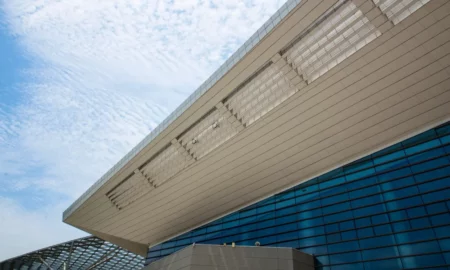 Property protection is the primary reason for both residential and industrial roofing systems. When it pertains to the materials that were utilized to construct them, they are very unlike. One-ply (TPO, EPDM), asphalt, bitumen-modified built-up roof systems, tar, and other industry-approved building and roofing materials are frequently the chosen mediums in commercial roofing systems.
Property protection is the primary reason for both residential and industrial roofing systems. When it pertains to the materials that were utilized to construct them, they are very unlike. One-ply (TPO, EPDM), asphalt, bitumen-modified built-up roof systems, tar, and other industry-approved building and roofing materials are frequently the chosen mediums in commercial roofing systems.
Residential roofs are usually built of roofing materials such as asphalt or concrete, depending on the climate.
The BUR Membrane or built-up roofing
The tar as well as gravel roof method is called built-up roof, or BUR roof. This type has several ply or heaps, and that increases the system’s toughness. If you’re searching for a minimal slope roof that is equally strong and tough, BUR makes a great alternative.
A metal roof
A well-known style of business roof is metal. These roofs come in many materials, like metal tile sheets, flexible galvanized steel, polished stainless steel, and many other types of solid and heavy-duty composite materials.
Commercial metal roofs remain strong and possess excellent fire ratings. To stop corrosion and damage from being subjected to sunshine and other environmental variables, they frequently contain protective coatings. They aid in your building having a more environmentally friendly makeup while still serving as an appealing alternative.
Roofing made of modified bitumen
The modified bitumen commercial roof system, sometimes referred to as a mod-bit roof, consists of plies of bitumen and reinforced roofing materials. When compared to conventional industrial flat roofs, the modified bitumen roofs are known to offer greater tensile strength as well as being easy to maintain. If you anticipate a great deal of activity, an Industrial Roofing Company will suggest this type is a smart choice.
EPDM or Thermoset Roof Membrane
When contrasted with other kinds of business roofs, thermoset roofing, best referred to as EPDM roofing material, is durable, and simple to maintain. Additionally, EPDM roofs provide advantages including flexibility at freezing temperatures, resistance to certain solvents, acidic substances, and alcohol, and reflecting qualities that can save cooling costs.
Roofs made of thermoplastic materials, such as thermoplastic polyolefin (TPO) and polyvinyl chloride (PVC), are ideal for second-generation applications. They are thin, highly reflective, and resistant to bacterial development, most chemicals, UV radiation, and punctures. Restaurants, accommodations, and other establishments that emit oils through their ventilation systems are perfect candidates for commercial PVC and TPO roofs.
Rooftop Green System
Recently, green roofs have gained popularity as a sustainable solution for buildings. They can boost productivity and deal with drainage and water issues. Commercial roofing materials made of them are also visually beautiful and environmentally sustainable.
Construction of Commercial Roofs
Industrial roofing materials may be utilized with a variety of construction methods, depending on the type of material, the number of labor hours, and the level of complexity. Selecting a reliable industrial contractor who can do the work at your leisure, on schedule, and within your budget is helpful.
Roof examination
A business roofing system should have the decking, air vents, flashing, downspouts, and plumbing for drainage fully inspected. Click here to read more on roof flashing. By doing this, you may reduce the possibility of roof damage, find any issues quickly, and save money on future expensive repairs.
Maintenance of Commercial Roofs
Along with inspection, proper care is crucial to extending the usefulness of a commercial roof. It includes cleaning up debris, mending HVAC units and roof flashing, preparing your roof during each season, and ensuring sure the roofing material is in excellent condition. It also requires taking management of any possible leaks, rips, along with water damage.
The cost of commercial roofing services including installation, assessment, and maintenance varies based on a variety of variables. This includes the following:
- The particular type of roof, easy access, plus slope determine how much labor, time, apparatus, and additional resources are required.
- The construction and upkeep of the company roof require the necessary local permits.
- The overall depth of the services plus the size of the roof will have a big impact on the cost of industrial roofing services.
- If your commercial roof includes additional features like windows, chimneys, and others, the cost may increase.
How long does an industrial flat roof typically last?
The kind and resources used to construct a business roof affect how long it lasts. PVC roofs may endure for more than 20 years, EPDM flat roofs for about 30 years, and TPO roofing for businesses for about 15 to 20 years. The manner in which you maintain a roof will also affect how long it lasts.
What Materials Are Used in Commercial Flat Roofs?
Modern flat roofing systems for businesses often employ single sheets of PVC, TPO, EPDM artificial rubber, and other materials. They are employed in substantial commercial structures and are of outstanding quality.
Picture Credit: Freepik
